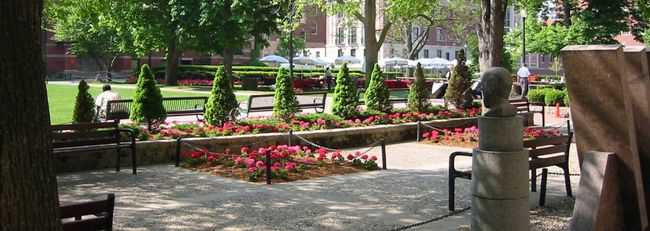
BU Nephrology Fellowship Program offers a robust array conferences and didactics that cover all aspects of nephrology.
Conferences
- Clinical Case Conference: Clinical fellows with faculty guidance or faculty alone present an interesting clinical case for discussion. The diversity in patient population at our training sites allows us to see and learn from a rich spectrum of clinical cases. Clinical case conference occurs three weeks a month from 3-4 pm on Thursdays.
- Journal Club: Clinical and research fellows present a recent article from major nephrology and general medicine journals. Fellows and faculty critically appraise the article and discuss the direct clinical implications of research findings. Journal club occurs weekly from 2-3pm on Fridays.
- Pathology Conference: Kidney pathologist reviews pathology slides from selected kidney biopsies done over a course of the preceding month. Light microscopy, immunofluorescence and electron microscopy slides are reviewed. Typically 2-3 cases are presented and discussed in detail. Pathology conference occurs once a month from 3-4pm on Thursdays.
- Research Conference: Internal (both faculty and research fellows) and invited external speakers give a presentation on a contemporary nephrology-related research topic. Distinguished visiting professors (see below) are routinely invited to give presentations and meet with our fellows and faculty. Research conferences occur weekly from 2-3pm on Thursdays.
- Multi-disciplinary Transplant Conference: Transplant nephrologists, surgeons, psychiatrist, coordinators, social workers, dieticians, pharmacists, and donor advocates meet to discuss and decide on the candidacy of all potential kidney transplant recipients and donors. A fellow on the transplant rotation is expected to participate in this conference. Transplant conference occurs on Tuesdays from 12:30 to 1:30pm.
Didactics
- Bootcamp Series: Bootcamp series occurs for one and half weeks at the beginning of fellowship. Bootcamp series includes lectures on must-know clinical nephrology topics, simulation center experience, acute hemodialysis and peritoneal dialysis clinic sessions with nurses (to learn about kidney smart education sessions, peritoneal dialysis training, hemodialysis machine preparation, access cannulation, etc), case-based practical sessions on handling night calls, and two half-days of shadowing Senior Fellows on consult services.
- Intro videos to PD: (Dr. Lauren Stern) dropbox.com
- Core Lectures: Lectures covering all the important topics in clinical nephrology are provided to fellows on a weekly core lecture that is scheduled from 12-1pm on Wednesdays.
- Special Lectures: Special lectures are provided on renal pathology, kidney transplantation, and dialysis related topics. Lectures on each of these categories occur once a month on Fridays from 1-2pm from September to May of the academic year.
Visiting Professors
International and national experts are invited as Visiting Professors periodically from September to June. They present at renal research conferences, and engage with faculty and fellows during their stay at Boston Medical Center.
Bel Idelson Memorial Lecture is one of the Department of Medicine’s Named Lecture where an invited internationally renowned physician scientist presents on a contemporary nephrology-related topic.
Formal Training for Research Fellows
1. Fellows doing Basic Science Research
While formal post-graduate degree-level coursework is not a requirement of the research fellowship training program, fellows may elect to take part in the graduate medical science programs at BU School of Medicine depending on their area of research. Several of our prior trainees have undertaken coursework and research towards a PhD degree under the mentorship of a faculty from the Nephrology Section and an associate faculty from basic science departments. The Graduate Program in Molecular Medicine, supported by the Department of Medicine, provides an opportunity for pre- and post-doctoral trainees to obtain a PhD or MD, PhD degree during their training.
2. Fellows doing Clinical Research
Fellows in clinical research training are expected to participate in the BU’s Clinical and Translational Science Institute’s Clinical and Research Training (CREST) Program. The CREST program provides post-graduate fellows or scientists the essential tools and competencies needed to achieve a successful clinical research career. The CREST program also allows research fellows to enroll in the Master’s degree programs in Public Health, Epidemiology, Health Services Research, or Clinical Investigation.